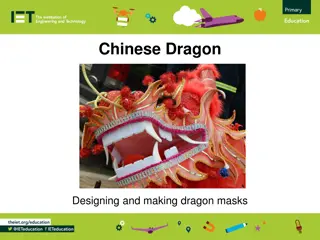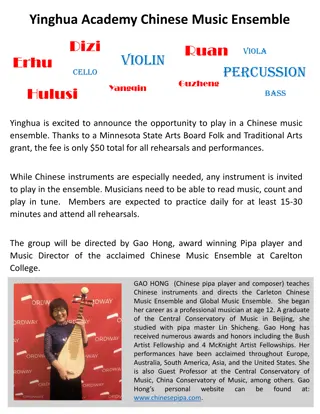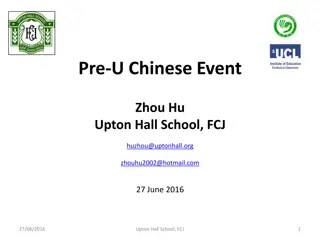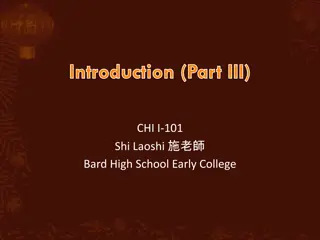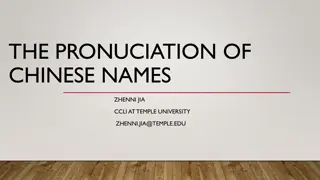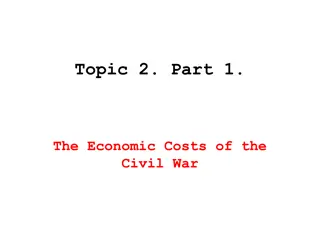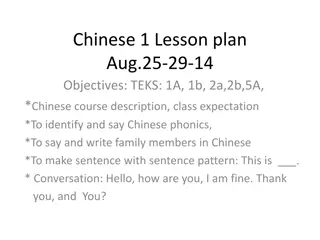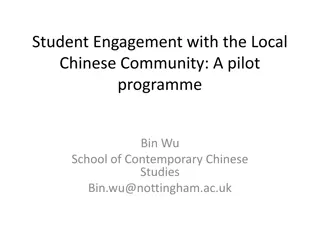Causes and Origins of the Chinese Civil War
The Chinese Civil War was sparked by a variety of factors including a power vacuum, weak government, competing interests, ideological differences, and foreign intervention. Demographically, China is primarily inhabited by the Han Chinese with over 500 national minorities. The Qing (Manchu) dynasty's weaknesses, such as inflation and corruption, also played a role, leading to discontent among the people. The timeline of events leading up to the Communist regime's establishment in 1949 highlights the turbulent history of China during this period.
Download Presentation

Please find below an Image/Link to download the presentation.
The content on the website is provided AS IS for your information and personal use only. It may not be sold, licensed, or shared on other websites without obtaining consent from the author.If you encounter any issues during the download, it is possible that the publisher has removed the file from their server.
You are allowed to download the files provided on this website for personal or commercial use, subject to the condition that they are used lawfully. All files are the property of their respective owners.
The content on the website is provided AS IS for your information and personal use only. It may not be sold, licensed, or shared on other websites without obtaining consent from the author.
E N D
Presentation Transcript
Causes of Chinese Civil War Chinese Civil War overview of causal factors; Role of ideology Power vacuum weak government Competing interests Differing groups Equality of military power between groups Discontent Foreign intervention
Chinese Emperors http://www.inkdancechinesepaintings.com/emperor-empress/picture/3541005.jpg
Demography of China Demography of China Over 90% - Chinese (Han) Over 500 national minorities . They form a small part of the population but occupy half of China s territory. The Manchus were from Manchuria, related to Mongols.
Brief Timeline Brief Timeline 1911 Manchu dynasty overthrown by revolution. Republic set up, but fails to take hold. 1927 Civil War breaks out 1937 Civil War interrupted by Sino-Japanese war (leading into Second World War) 1946 Civil War re-started 1949 Communist regime set up in China
Weakness of the Qing (Manchu) dynasty Weakness of the Qing (Manchu) dynasty Weakness of the Qing (Manchu) dynasty Inflation and corruption weakened financial position of Manchus (Rogers & Thomas, p. 253) Involvement of regional armies to put down Taiping Rebellion (1850 1864) began the move away from centralized control (Rogers & Thomas, p. 253)
Discontent amongst the people Discontent amongst the people Peasants (Rogers & Thomas, p. 252) Hard life and extremely poor Paid the taxes for the imperial court Subsistence farming techniques made famine more likely Imbalance between increase in population and increase in cultivated land Landlords increased rents Driven to cities by poverty where there was high unemployment Prince Chun, regent from 1908 increased taxation and frustrated the business class (Rogers & Thomas, p. 254)
Anti Anti- -foreign feeling foreign feeling Chinese empire carved into spheres of influence (Europeans, Americans, Japan) (Rogers & Thomas, p. 253) Unequal treaties gave them power over trade, territory and sovereignty (Rogers & Thomas, p. 253) Defeated by Japan 1895, and loss of territory to Japan in 1905 (Rogers & Thomas, p. 254) Anti-Western feeling resulted in Boxer Rebellion in 1899 (Rogers & Thomas, p. 254) Missionaries and converts to Christianity hated as symbols of foreign influence
Opposition from constitutionalists Opposition from constitutionalists There were increasing demands by constitutionalists for parliamentary government, local self-government and an independent judiciary (Gray, p. 140) The autocratic nature of the constitution introduced in 1908, and domination of the cabinet by Manchus and Mongolians, inflamed the feelings of the constitutionalists (Gray, p. 141) The Court also sought to weaken the provincial Governors-General, the greatest of whom were Chinese. For example, when Prince Chun took over in 1908, he gave Yuan Shikai leave to retire to nurse an injured foot. (Gray, p. 141) The Regent created elected consultative provincial assemblies in 1909, however this was with the hope of increasing the effectiveness of central government, not promoting decentralization (Gray, p. 141) This had the opposite effect however: New economic interests that were developing rapidly were provincial rather than national, in their markets, organisation and relations to government The examination system had been abolished in 1906 and this meant that the source of benefits for political action was no longer the national but he provincial capital. Because the setting up of a national parliament was delayed, provincial assemblies gained authority from being the only elected bodies. Political leaders invested in working at the provincial level and went beyond a consultative role to governing provinces in virtual autonomy. They were not republican however, but sought a constitutional monarchy along western lines. (Gray, p. 142)
Cause of Chinese Civil War Cause of Chinese Civil War The long-term causes of the Chinese Civil War were the fact that China was divided along regional lines, and that there was a strong foreign influence in China. Regionalism Increased authority and power of regional assemblies from 1909 October 1911 revolution involved provinces declaring independence Michael Lynch Quote Although brief united government, China resorted to regionalism during warlord era 1920s Regionalism was exacerbated by foreign influence, as China had been carved into several spheres of influence. Hatred of this imperialism also added to the discontent with the current system of government. Boxer Rebellion 1899 Warlord era increased sense of humiliation and nationalist feeling. May Fourth movement against warlords, traditional culture and Japanese
Cause of Chinese Civil War Cause of Chinese Civil War cont Because the Republic failed to unite the country and rid China of foreign influence, a short-term cause of the civil war arose, which was the development of the GMD and CCP, and creation of the First United Front. Desire to unite China Development of the GMD and CCP Initially united and motivated by anti-imperialism and nationalism Destruction of warlords (could be seen as revolution, rather than civil war at this point) success as a result of weak government cont/d /d Nevertheless, the civil war was played out between the GMD and CCP, and arose as a result of an ideological conflict between two groups who wanted power. Differences in ideology Treatment of CCP by GMD
Conclusion Conclusion In conclusion the main cause of the Chinese Civil War was the fact that the two ideologically opposed groups were seeking to control a united China. The historical context was important to allowing this to develop. The desire for a united China arose out of the years of division and imperialism experienced within China. Regionalism in turn contributed to the collapse of the Republic and the warlord era. This era led to an increase in nationalism and essentially left a power vacuum in China. As a result support for the CCP and GMD grew, and the First United Front was provided with the opportunity to seize control. Nevertheless, had the First United Front remained united, the outcome would have been a revolution rather than a civil war. It was the fact that the GMD turned against the CCP, and that both sides were equally matched, which turned this into a long civil war.
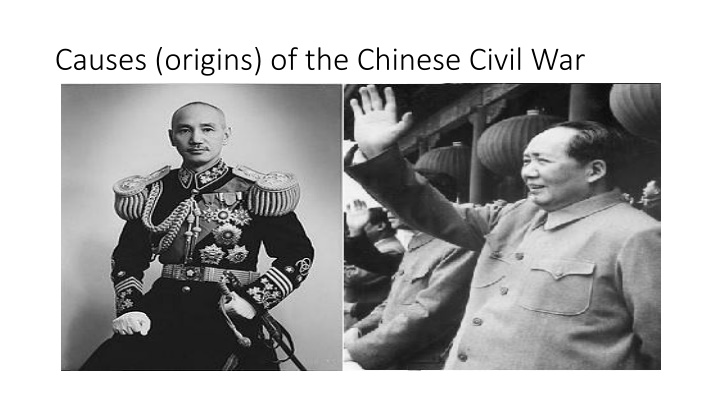

![❤[PDF]⚡ Civil War Talks: Further Reminiscences of George S. Bernard and His Fel](/thumb/20551/pdf-civil-war-talks-further-reminiscences-of-george-s-bernard-and-his-fel.jpg)
